|
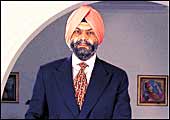 With
just days to go before D.S. Brar exits Ranbaxy as its CEO
and Managing Director on July 4, the race to woo him over has intensified.
Earlier, rumours were that Brar would join a fast-growing pharma
company in Hyderabad, but now a Bangalore-based rival is said to
be courting Brar with the same brief: create another pharma MNC.
But the man himself seems averse to being an employee ever again.
"If I wanted to do that I would have continued at Ranbaxy,"
Brar told BT on his way to Prague to attend a pharma gabfest. "I
want to do something on my own." To that end Brar, who recently
agreed to join the board of Mphasis after months of wooing, has
shortlisted three options, two of which could include turning a
venture capitalist or an entrepreneur. "I'll be finalising
my plans in another 10-15 days," Brar said. Pharma companies,
keep your fingers crossed and just hope that he doesn't turn a competitor. With
just days to go before D.S. Brar exits Ranbaxy as its CEO
and Managing Director on July 4, the race to woo him over has intensified.
Earlier, rumours were that Brar would join a fast-growing pharma
company in Hyderabad, but now a Bangalore-based rival is said to
be courting Brar with the same brief: create another pharma MNC.
But the man himself seems averse to being an employee ever again.
"If I wanted to do that I would have continued at Ranbaxy,"
Brar told BT on his way to Prague to attend a pharma gabfest. "I
want to do something on my own." To that end Brar, who recently
agreed to join the board of Mphasis after months of wooing, has
shortlisted three options, two of which could include turning a
venture capitalist or an entrepreneur. "I'll be finalising
my plans in another 10-15 days," Brar said. Pharma companies,
keep your fingers crossed and just hope that he doesn't turn a competitor.
 Turnaround
Time Turnaround
Time
After more than 20 years as a consultant with
multinational firms such as KPMG and Andersen, Narayan Seshadri
has called it quits. The 47-year-old Chartered Accountant, who
most recently was the Managing Director of business advisory services
at KPMG, stepped down from his 14-month job in May to pursue "interesting
things that you cannot do in a multinational firm". Since then,
Seshadri has been working with a couple of small distressed companies
in a bid to turn them around. "With a little bit of financial
and operational restructuring, a lot of jobs can be saved,"
says Seshadri. Next on his agenda: A small firm of like-minded people.
Low Tide
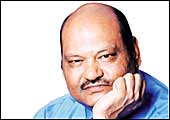 Late
last year when Anil Agarwal listed his Vedanta Resources
(read: Sterlite Industries) on the London Stock Exchange, he pointed
to India's huge mineral resources and privatisation of state-owned
aluminium and copper companies as reasons why investors should pay
$1 billion for 130 million shares in his holding company. While
India's mining potential still remains, privatisation under the
new United Progressive Alliance looks less certain. Result: Vedanta,
which aspires to be a metals major like Britain's Anglo American,
is down some 30 per cent since listing. Even a better-than-expected
year-end results (delayed by a week because of problems related
to converting Indian accounts to UK standards) did not cheer investors.
Meanwhile, Agarwal, whom BT could not reach for comment, plans to
lick his company into even better shape with greater cost control
and product efficiency. But it will take a lot more-and not all
of it within Agarwal's control-to talk the stock back up on LSE. Late
last year when Anil Agarwal listed his Vedanta Resources
(read: Sterlite Industries) on the London Stock Exchange, he pointed
to India's huge mineral resources and privatisation of state-owned
aluminium and copper companies as reasons why investors should pay
$1 billion for 130 million shares in his holding company. While
India's mining potential still remains, privatisation under the
new United Progressive Alliance looks less certain. Result: Vedanta,
which aspires to be a metals major like Britain's Anglo American,
is down some 30 per cent since listing. Even a better-than-expected
year-end results (delayed by a week because of problems related
to converting Indian accounts to UK standards) did not cheer investors.
Meanwhile, Agarwal, whom BT could not reach for comment, plans to
lick his company into even better shape with greater cost control
and product efficiency. But it will take a lot more-and not all
of it within Agarwal's control-to talk the stock back up on LSE.
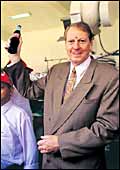 Stealth
Mission Stealth
Mission
Coca-Cola chairman and CEO E. Neville Isdell's
secret visit to India last fortnight turned out to be a pr fiasco.
The Indian managers of the Atlanta-based beverages maker went out
of their way to deny Isdell's visit, even throwing a red herring
about him coming in July not June. But Isdell, a Coke veteran recalled
from a two-year retirement to head the troubled company in May,
did indeed wing into Delhi aboard his jet Gulf Stream 5 and was
even spotted at a five-star hotel. So, an occasion to reap reams
and reams of newsprint space (not to mention, hours of airtime)
turned into a pr disaster. Why did coke managers in India deny,
even mislead media about, Isdell's visit? Beats us. An office wag
has offered an explanation: Maybe somebody told Isdell that he was
visiting not India but Iraq.
Man Friday
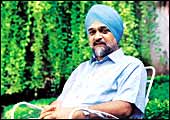 More
than a decade ago, he was part of the core team that scripted India's
reforms story. Now, with his former political boss returning as
the Prime Minister of India, the services of Montek Singh Ahluwalia
have been requisitioned once more. Except this time around,
Ahluwalia, until recently a Director in IMF's Washington, D.C. office,
won't be getting a room in North Block but Yojana Bhawan, headquarters
to the Planning Commission. That may seem like an odd job for a
man widely respected for his economic acumen, but in reality may
be Prime Minister Manmohan Singh's way of ensuring that a near-defunct
agency returns to being the central think tank it was originally
intended to be and not a parking slot for retired bureaucrats that
it has turned into of late. But whether Ahluwalia manages to revive
the Planning Commission will hinge on something else too-the longevity
of the current administration. More
than a decade ago, he was part of the core team that scripted India's
reforms story. Now, with his former political boss returning as
the Prime Minister of India, the services of Montek Singh Ahluwalia
have been requisitioned once more. Except this time around,
Ahluwalia, until recently a Director in IMF's Washington, D.C. office,
won't be getting a room in North Block but Yojana Bhawan, headquarters
to the Planning Commission. That may seem like an odd job for a
man widely respected for his economic acumen, but in reality may
be Prime Minister Manmohan Singh's way of ensuring that a near-defunct
agency returns to being the central think tank it was originally
intended to be and not a parking slot for retired bureaucrats that
it has turned into of late. But whether Ahluwalia manages to revive
the Planning Commission will hinge on something else too-the longevity
of the current administration.
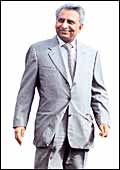 "Test"
Pilot "Test"
Pilot
Controversy and jet airways Chairman Naresh
Goyal seem inseparable. Be it his airline's source of funds
or his legendary clout with political powers that be. Now there's
a new one: Allegations that Jet has applied for landing slots in
prime Asean destinations even though the government is yet to allow
private carriers that privilege. Jet's defense: "We have not
applied for any slots; we were merely checking on the availibity
of these slots," states Nandini Verma, Vice President, Corporate
Affairs. As of now, private airlines are only allowed to fly to
Saarc countries, and an amendment is only expected in September.
Jumping the gun aside, Jet has ambitious plans that include acquiring
wide body jets as it eyes destinations like Malaysia, Bangkok and
Singapore and eventually Europe and America. Given that long hauls
are more profitable, Goyal's impatience is easy to understand.
-Contributed by R. Sridharan,
Roshni Jayakar, Sahad P.V., Abir Pal, and Aditya Wali
|
